What it costs to live in Bali – how you could save by moving overseas
7 min read- Aussies are moving to Bali to live much more cheaply
Australia is one of the world’s most expensive places to live so it’s hardly surprising retirees are moving to Asia for a better lifestyle for a fraction of the cost.
Bali is the most popular overseas holiday destination for Australians, after New Zealand. But unlike our Kiwi neighbours, Bali offers affordable luxury real estate by the beach with a much warmer climate all year round – making it an ideal place to retire.
Boomers on the age pension – and even some Gen Xers – are selling up in the suburbs of Australia’s big cities, leaving behind the traffic congestion and housing stress for a Bali villa by the ocean.
And it’s not just retirees making the move either: the work-from-home revolution since Covid has also turbo-charged demand for real estate in the tropical paradise.
Those who find Kuta too busy can also try Uluwatu, a popular surf beach, or nearby coastal districts such as Legian and Seminyak.
Marie Stephens, a grandmother in her late fifties, left the Gold Coast in 2018 to live in a villa in Legian and has never looked back.
She loves how there’s so much more to do in Bali, and it feels safer as an older person.
‘The difference is it’s way livelier. There’s such a better nightlife,’ she tells me.
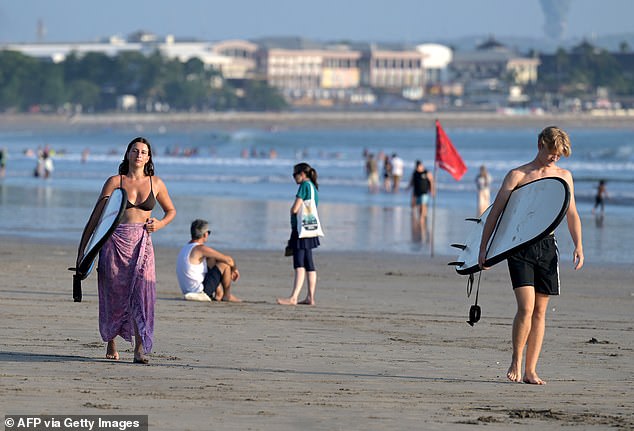
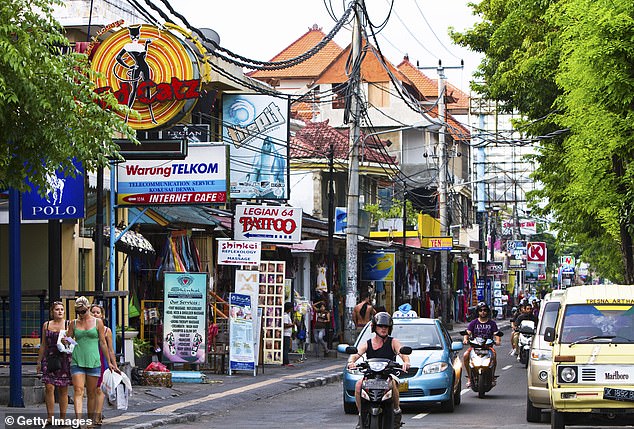
‘As an older person, you don’t feel intimidated going to bars and things like that – there’s always beach bars open with live music.
‘On the Gold Coast, I just found at my age, where do you go? Do you go to the casino? There’s just not a lot of bars to go to.
‘Here, it’s endless. One street, there are 20 bars but when you’re on the Gold Coast, there’s just not as many.’
Then there’s the food which is so much cheaper than anything in Australia.
‘It’s obviously a lot more economical to live here,’ Ms Stephens says.
A plate of nasi goreng fried rice with chicken satay sticks is just $3.50 in Australian dollars, while a restaurant meal is typically just $6 for the likes of chicken with vegetables, a curry, a schnitzel or a stir fry.
‘You can go out and get a fabulous meal for $5, $6,’ she adds.
An iced tea is just $1.10, while a coffee is $2. Wine is a bit more at $6 a glass, while cocktails are usually about $10.
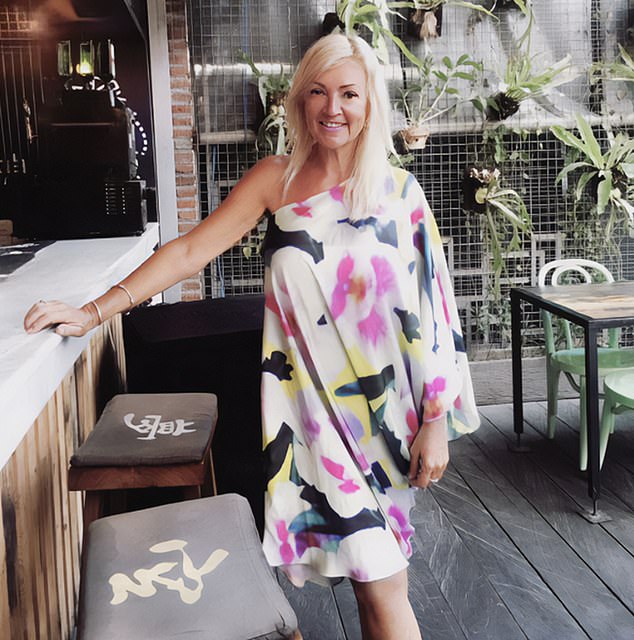
The bargains don’t stop with affordable food and drink: transport is also much cheaper with a taxi fare only costing about $5.
Gojek, Indonesia’s equivalent of Uber, is a steal compared to rideshare apps back home, Ms Stephens says.
Riding on the back of a motorbike is just $1 for one trip. Car hire is just $25 for the whole day.
Ms Stephens, who sells property in Australia and Indonesia but lives in Bali full-time, has made plenty of friends with other expats as someone who is single.
‘There’s a huge circle of expats here – huge. There’s great social life, great friendships,’ she tells me.
‘Lots of people from the Gold Coast that I know have moved here and it’s really easy to make friends because there are so many people living here who are liked-minded.
‘It’s just much more relaxed.’
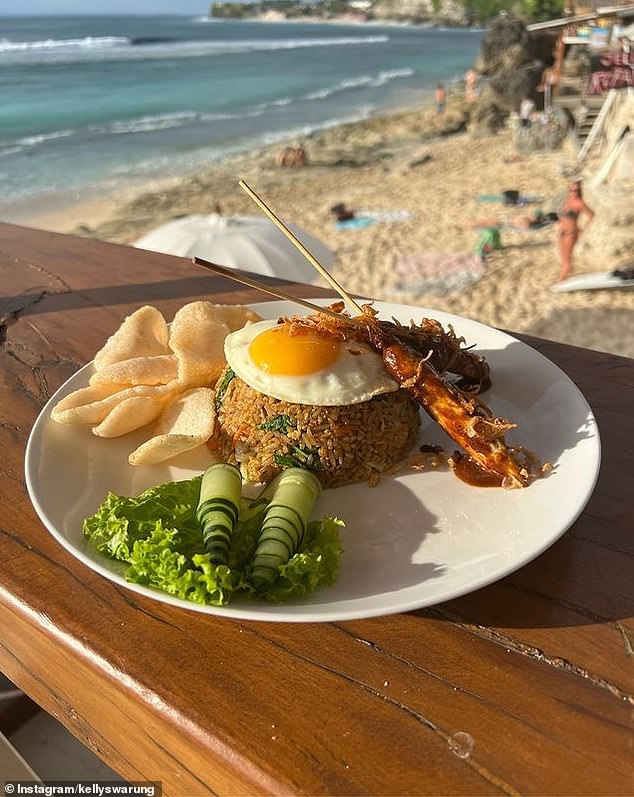
Buying property in Bali
Foreigners are banned from buying land or real estate in Indonesia unless they set up an investment company registered locally known as a PMA, or penanaman modal asing.
The most common way to buy a villa in Bali is instead to pay a decades-long lease upfront to the landowner, which is the closest thing to purchasing a house.
In Australia, renters pay weekly or monthly, but in Indonesia, cashed-up foreigners pay a big upfront lease to a property owner in the hundreds of thousands of dollars.
Isabel Whitaker, a 47-year-old business owner with two children in their twenties, last year paid $600,000 for a 25-year lease, which also included the cost of developing a three-bedroom clifftop villa at Uluwatu with three ensuite bathrooms and a ‘massive pool’.
‘It’s amazing, it’s five minutes from the beach, it’s five minutes from everything there,’ she tells me.
‘I was nearly in tears when I went there, it was incredible. I’m very lucky because I hit the jackpot – it’s a dream.’
For the price of a one-bedroom unit in Sydney, Ms Whitaker will be living like someone in a mansion near the harbour.
‘It’s like if I suddenly moved to Double Bay. I got in at the right time,’ she says.
The Svara complex she bought into, built by developer Mazari Villas, has luxury homes that have sold from $343,000 to $661,000.

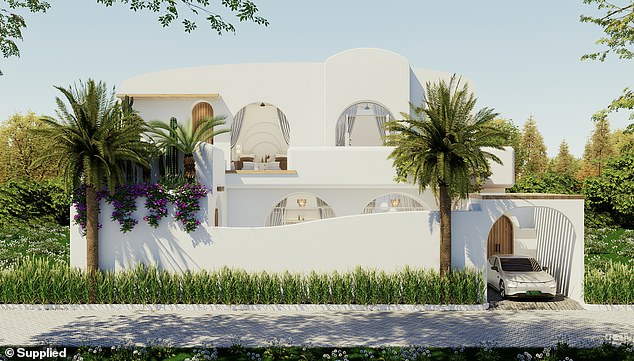
Ms Whitaker paid for the lease in July 2023 without ever having visited Bali. She stayed at the property for the first time in July this year.
‘I wanted something close to Australia so that when my kids eventually have their kids, I can come back easily and I can help them out with the grandchildren,’ she says.
By the end of next year, she is planning to sell her five-bedroom house at Oakdale, in Sydney‘s south-west, for $1.5million along with her business, The Chocolate Library in Camden.
She wants to quit working 10-hour days, seven days a week, and move into her new Bali home, with the development almost complete.
Ms Whitaker is planning to spend four months a year in Bali, another four months a year travelling the world, and the remaining four months staying with her daughter, 24, and her boyfriend when they eventually buy a house with a granny flat.
‘For me, it’s all about wanting to have a certain kind of lifestyle when I do “retire” – in inverted commas – so the main thing for me was travel,’ she explains.
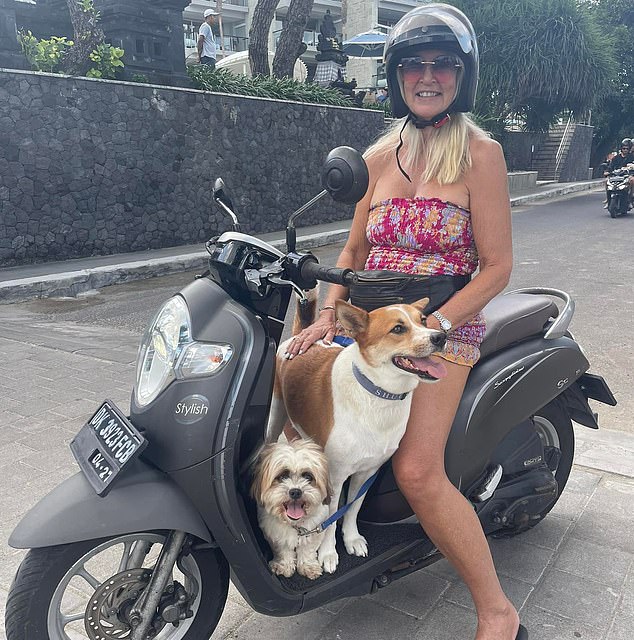
‘I wanted to see as much of the world as I possibly could. Yes, I’ll be technically retiring, but what I’d love to do is go to different places and teach English as a second language, to do that kind of thing in different places.’
Ms Stephens, who flies back to Australia every three months to visit her family on the Gold Coast, initially moved to Legian in 2018, paying $37,000 for the final five years of an existing lease on a three-bedroom villa.
She has since moved to Seminyak, paying $450,000 for a 25-year lease on a similar-sized villa with a pool that was in need of renovation.
Annual leases in her suburb are about $30,000 a year.
‘Everyone wants to move here because it’s cheaper to live here – it’s still far cheaper to rent or lease than it is in Australia,’ she says.
Despite Australia being a much more expensive place to live, Ms Stephens is reluctant to criticise the country where she remains a citizen.
‘I do love Australia and I’m Australian and I’m very proud of that so there isn’t anything bad about Australia – but it’s just a completely different environment to live in,’ she says.
‘It hasn’t got as much to offer, that’s a diplomatic way of saying it.’
Getting the age pension overseas
Australians living overseas can still qualify for the aged pension of $1,020.60 a fortnight for singles.
But they have to move back to Australia for two years to continue receiving Centrelink payments. That’s because there is a two-year waiting period before the age pension is portable.
If someone leaves Australia before that two-year period is up, their payment is cancelled and they have to move back to Australia to reapply.
The pensioner concession card is cancelled if someone has been out of Australia for six weeks. For the Commonwealth senior’s health card, it’s 19 weeks.
Those living overseas are advised to have a myGov account to receive Centrelink notifications.

Getting private health cover
Living overseas also means getting private health insurance to cover private hospital cover or elective surgery, should something go wrong.
Ms Stephens recommends getting overseas visitor cover with the likes of Allianz.
‘Some people get concerned about [the hospitals in Bali] because they’re getting a little bit older – but they’re good,’ she says.
‘A lot of people are frightened to come here because they don’t think the health system’s good, but we’ve got really good hospitals here.’
Residency, visas and citizenship
Indonesia does not offer dual citizenship for adults, meaning Australian retirees cannot apply for a passport and must obtain the correct visa.
But expats can apply for permanent residency – known as kartu izin tinggal tetap or KITAP – if they have lived in Indonesia for five years.
A KITAS visa (kartu izin tinggal terbatas) allows foreigners to live in Indonesia for an extended period either as workers, investors, retirees or students.
Ms Whitaker is on a two-year investor KITAS visa, which she will need to renew. Ms Stephens is on a similar visa that allows her to stay in Indonesia without becoming a permanent resident.
Retirees can stay for five years if they are 60 or older and can prove they can draw AU$53,000 per year from their superannuation.
They also have to sign a one-year lease and have no plans to work in Indonesia.
Foreigners staying in Indonesia for more than three months need to obtain a temporary stay permit known as an ITAS or izin tinggal terbatas.
This means Australian expats would need an employer as a sponsor to obtain a permit that lasts for six to 12 months. This permit can be renewed four times.
The ITAS permit is also available for foreigners who marry an Indonesian, but it only lasts for a year.



